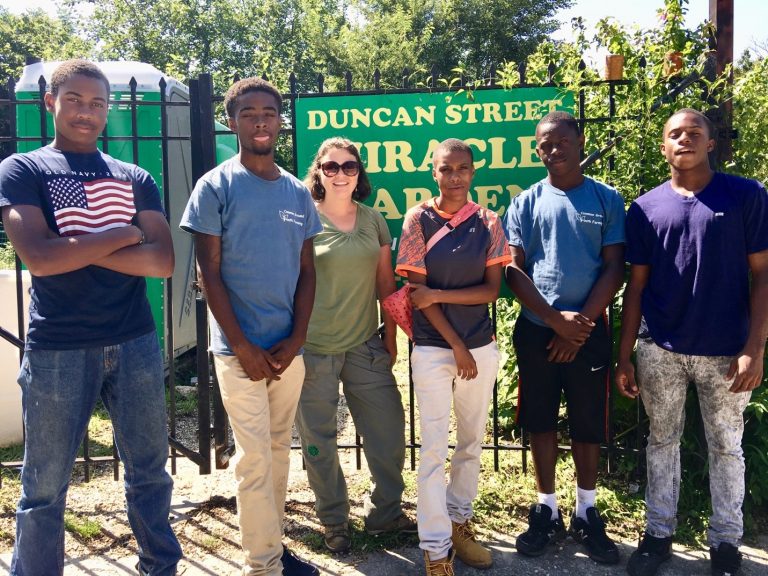by Abby Rammelkamp
Mr. Lewis Sharpe has been gardening at the Duncan Street Miracle Garden for 34 years, improving the neighborhood, beautifying it, and nourishing the neighbors. In addition to the vegetables and fruits that grow there, this year the garden is cultivating another important crop: young people.
The teens are employed by the Common Ground Youth Farming program to grow flowers at Duncan Street Miracle Garden, preserved by Baltimore Green Space since 2010, as well as at Tha Flower Factory. Common Ground combines founder Jennifer Will-Thapa’s background in conflict resolution in the juvenile justice system with her interest in gardening. She saw that the young people she worked with in the court diversion program were in need of productive activities, while community farms in Baltimore needed their youthful energy and offered opportunities to teach them useful skills. With funding from the Open Society Institute, Jennifer devised a plan for a 30-week program that pays the participants, called “growers,” to grow flowers that are sold to flower retailers, while also educating them in the work habits and interpersonal skills that will make them successful in their adult lives, such as teamwork and reliability. When the growers are not in the gardens cultivating the plants, they attend workshops in financial literacy, banking, and floral arranging. A writer from Morgan State is providing weekly classes on poetry and literature for 10 weeks.
The program follows a three-pronged approach: Real Work, Real Accountability, and Real Talk. Real Work is the nitty-gritty of gardening, the weeding, shoveling, watering, making plant beds, planting seeds and seed trays, mulching, creating soil mixes, tilling the soil, and using the equipment. Real Accountability is the standards that everyone agrees on and the behavior that is expected in the workplace. Failures to meet these standards are called missteps, and include not coming to work, not following instructions, or not acting professional and using bad language. Missteps will result in $5 deductions from the bonuses that the participants earn on top of their hourly wages. Real Talk is a mutual feedback loop for everyone in the program, supervisors and growers alike. It takes place at pay time and focuses each time on two things that have gone well and one thing that needs more work. Bonuses reinforce good work, such as doing what Mr. Sharpe asks for and doing things that need to be done without being told to do them.
Gardening is hard work, and Baltimore’s hot, humid weather makes working outside uncomfortable and stressful at times, but the program has ways to keep the participants on track and tensions under control. The program stresses team-building through weekly “dialogue circles” that bring to light issues on the farm or in the community that need to be discussed. Sometimes circles take place more than once a week to help the growers and supervisors know “where everyone’s at” and to enable each person to express himself. As one grower, Davion, explains, “You express how you feel about what’s going on in your life and how you feel about somebody else and how they feel about you. It’s interesting because you find out what other people think about you and you learn from it.” It helps the team to work together to check in with everyone at the start of each shift and see how they’re feeling. Destiney, another grower, says it’s important to know each person’s mood each day so that they can take other people’s feelings into consideration. “Since we’re all going to be working together with our hands as a team, you want to know how your teammates are feeling, so you know if they might not want to talk that day and we give them their space. So maybe we’ll know that before we start.” Jennifer points out that when something is going on in someone’s life, people have said it helps to clear their head to work in the garden.
Two of the current group of growers participated in last year’s pilot program and liked it enough to want to return. Antwon likes the opportunity to learn and get paid for learning. Destiney was eloquent about why the program is a good experience for her. “It might not be fun all the time, other people might not enjoy working in the garden, but for me, the reason why I want to keep doing it is because I want to see the end result of everything. I want to be able to say, oh, I really did that and I learned a couple things. I know how to grow something. If I want to grow something, I know a couple techniques to grow on my own. I want to see the end result, how everything looks.”

Left to right: Frank, Miayon, Jennifer, Destiney, Antwon, Davion
Be the first to hear about exciting events, news, and opportunities.
[email protected]
(813) 530-8166
2100 Liberty Heights Avenue
Baltimore MD 21217
Facebook | Instagram | Twitter